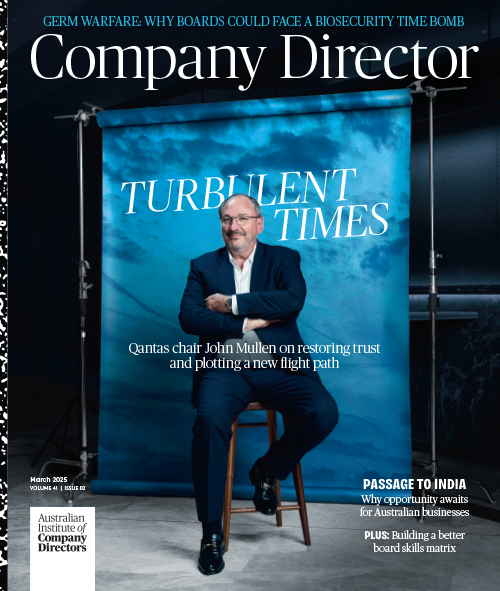For diversified NZ building and construction giant Fletcher, replacing both chair and CEO, for the second time in seven years, is a big ask.
I sympathise with the headhunter hired by the New Zealand construction group Fletcher Building, listed on both the ASX and NZX. On 4 March, the company announced that the chair, Bruce Hassall, decided to step down with immediate effect.
Director, Barbara Chapman, will step in as acting chair and, according to a company statement, will now lead the external and internal process for appointing the new permanent chair, who will then progress the appointment of a new CEO to replace Ross Taylor.
In my view, the company has cemented its reputation as one that seems to, of late, surprise on the downside. Its NZ construction business has suffered net losses and impairments of $1.44b since the company launched a turnaround strategy in 2017. Fletcher shares declined in February, following a half-year loss of NZ$120m largely caused by a NZ$165m provision on the New Zealand International Convention Centre (ICC) in Auckland and a NZ$122m write-down on the Tradelink Australia business. Taylor, who was highly regarded in the NZ market, told the half-year earnings call on 13 February, “As CEO, taking accountability in these situations... sets the tone and expectation of the organisation from the top.”
It was a similar message from Hassall. “As part of the privilege of leading, we both recognise the buck stops with us and believe it’s important for us to take accountability for some of the recent issues we have had at the corporate level.”
Accountability is worthy of praise, but the sudden departure of a CEO can be highly disruptive because it signals a potentially radical change in strategy. Having the CEO and chair leave at the same time may be doubly disruptive because it usually means that as well as the likelihood of a strategy change, the new chair may make other significant changes, including to the make-up of the board.
It’s happened before
That’s what happened when Fletcher lost chair Sir Ralph Norris and CEO Mark Adamson in 2017. The board was refreshed by Hassall with the appointment of five new non-executive directors in September 2018. Two other directors were added in 2019 and 2023.
In 2017, its Iplex pipe business became mired in a Western Australia liability case, which one analyst says could cost $1.8b (a figure Fletcher describes as “inflammatory”). All the directors on the board at that time have left. A revamped board must make tough decisions. Does the company return to its roots as an NZ-domiciled building products and housing company with a network of hardware stores for tradies? Or does the board double down on the diversification strategy by buying more bolt-on businesses in Australasia?
Australia has not been a happy hunting ground for Fletcher. Its Tradelink business, now up for sale, has struggled in a sector characterised by profitable competitors.
In my opinion, Fletcher is far too complex and needs to be radically simplified. Diversification is meant to reduce risk and lessen earnings volatility, but Fletcher’s 32 different businesses have served to multiply problems rather than lessen them.
The latest events will bring a sense of déjà vu for many Fletcher shareholders. In 2017, Taylor’s strategic rethink included the following comment. “Fletcher is one of the most diversified building materials companies in the world with operations spanning multiple geographies, sectors, value chains and product lines.”
Bad luck and trouble
Taylor did his best to clean up the complexity, but maybe didn’t go far enough. Adding to his challenges was the COVID-induced mini-recession among building contractors in NZ.
Also, he couldn’t avoid the bad luck plaguing Auckland’s ICC. The project’s problems began in 2015 with a novated design-and-build approach that meant Fletcher carried more risk than it should. Problems were compounded after an accidental roof fire started by an unattended blowtorch in October 2019.
Efforts to extinguish it created further issues, including black mould and damage to steel pillars that cost NZ$300m to fix. Fletcher negotiated a deal with its insurers, but this meant it continued to carry the cost of remediation, which came back to bite the company.
Following the fire, Fletcher became a victim of its strategic decision to get out of the construction sector, which meant there was no pricing tension in tenders, further pushing up costs of completion.
On the bright side
Some things work in the headhunter’s favour. First, the ICC will be finished by early 2025. Second, the potential de-risking of the company through simplification should encourage optimism among candidates. Third, the pay is reasonable — Hassall was paid NZ$391,000 last financial year and Taylor earned NZ$6.6m.
A fourth potential drawcard is the prospect of a revitalised Fletcher returning to its glory days. In the early 2000s, it was a top-performing “growth” company with a return on equity of more than 20 per cent in each of the five years leading up to 2007. The Fletcher share price is not far off what it was 20 years ago. The stock is 40 per cent lower than when Taylor took over in November 2017, when he boasted a proven track record at Lendlease.
So, given Fletcher’s recent history and regular missteps, why would a world-class executive risk their career at a company that seems to keep surprising on the downside?
Why would a chair want to take on a role that requires immediate tough decisions — and potentially years of restructuring to right-size the company?
Whoever takes on the Fletcher top jobs would be wise to launch a comprehensive review of its risk management systems, dispose of its Australian assets and focus on its home market.
Disclosure: The author’s self-managed super fund owns shares in Rio, a company discussed in their March column.
Tony Boyd is an AFR contributing editor and former Chanticleer columnist.
This article first appeared under the headline 'Déjà Vu’ in the April 2024 issue of Company Director magazine.
Latest news
Already a member?
Login to view this content




